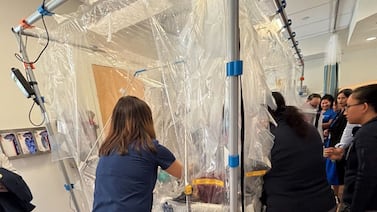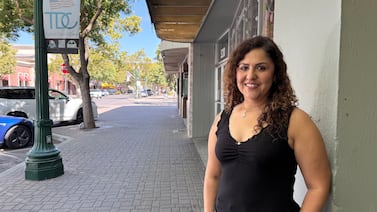Public health, explained: Sign up to receive Healthbeat’s free Atlanta newsletter here.
Funding for an Atlanta-based program that has provided nearly 1 million free HIV home testing kits nationwide has been restored, allowing it to continue for another year.
Together Take Me Home, based at Emory University, delivers the tests through an easy-to-use website and integration with dating apps. The program is funded by the Centers for Disease Control and Prevention and earlier this year received notice that its funding would not be renewed amid cuts to the CDC.
That decision has been reversed, said Dr. Travis Sanchez, the project’s executive director and a professor at Emory University’s Rollins School of Public Health. The project will get $10 million for its fourth year, which runs through October 2026 – $2 million more than the prior year. The grant was for around $55 million over five years, starting in 2022.
Together Take Me Home is funded through Ending the HIV Epidemic, an initiative launched by President Donald Trump during his first term, with a goal of cutting new infections 90% by 2030. The initiative has steered resources to the areas with the highest rates of HIV, including DeKalb, Cobb, Gwinnett, and Fulton counties in Georgia, which has the highest rate of new cases among states.
Nationwide, there has been a 12% reduction in new infections from 2018 to 2022, according to the CDC, and the number of new diagnoses each year has also decreased in Georgia, from 2,491 in 2018 to 2,350 in 2023.
The April letter canceling the funding for the home testing program said the CDC would no longer have the staff to oversee it. About 150 staffers who work on HIV prevention were laid off that month as the Trump administration moved to restructure the nation’s federal health agencies.
Since then, many have been recalled to work.
Together Take Me Home is the biggest self-testing program ever, Sanchez said, resulting in about 7,000 people learning that they have HIV. He estimates the tests have saved about $200 million in health care costs by connecting people to care early and preventing additional infections.
The kits use a simple online interface (offered in English and Spanish) and can also be ordered directly from apps like Grindr. Oral swabs provide results within 20 minutes and provide guidance about next steps if the result is positive.
The free, discreetly packaged tests help surmount financial and transportation barriers, as well as stigma. Similar home test kits cost about $40 or more at commercial pharmacies.
The program has been effective in rural areas, and more than half of those who have ordered the tests are under age 35, Sanchez said.
Home testing “is more confidential than walking into a local health department or even a local organization where you may be stigmatized,” said Daniel Driffin, a project manager at the HIV Vaccine Trials Network.
That many of the people who used the home service were first-time testers “creates a new opportunity to start testing habits that one can maintain over longer periods,” he said.
The CDC recommends that all Americans be tested for HIV at least once in their lifetime, but only about 40% of adults have been tested, according to 2024 data from KFF, a nonprofit health policy organization.
Each Together Take Me Home kit comes with two tests, so people can test themselves more than once or share.
Other participating partners in the project include the National Alliance of State and Territorial AIDS Directors and Building Healthy Online Communities, which helped build relationships with dating apps.
Sanchez said the project’s leaders thought it would end this fall, when funding was due to run out. But renewal came in the nick of time, and services were never disrupted. He wasn’t sure why it was restored.
The program is tied to a pre-existing campaign from the CDC called “Let’s Stop HIV Together” – hence the Together Take Me Home moniker.
Sanchez said he’s glad the program’s funding has been restored, but he’s still worried about support beyond the next year, as well as funding for HIV prevention in general. President Donald Trump’s proposed budget includes deep cuts to the CDC and a plan to move HIV prevention work to a new agency, the Administration for a Healthy America.
“We’re paying very close attention to that,” Sanchez said.
Rebecca Grapevine is a reporter covering public health in Atlanta for Healthbeat. Contact Rebecca at rgrapevine@healthbeat.org.






